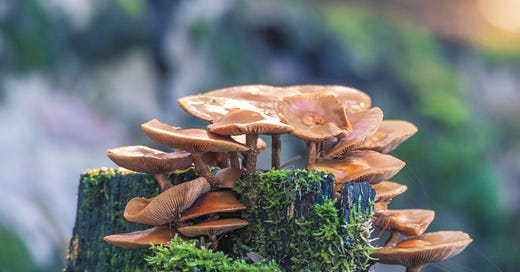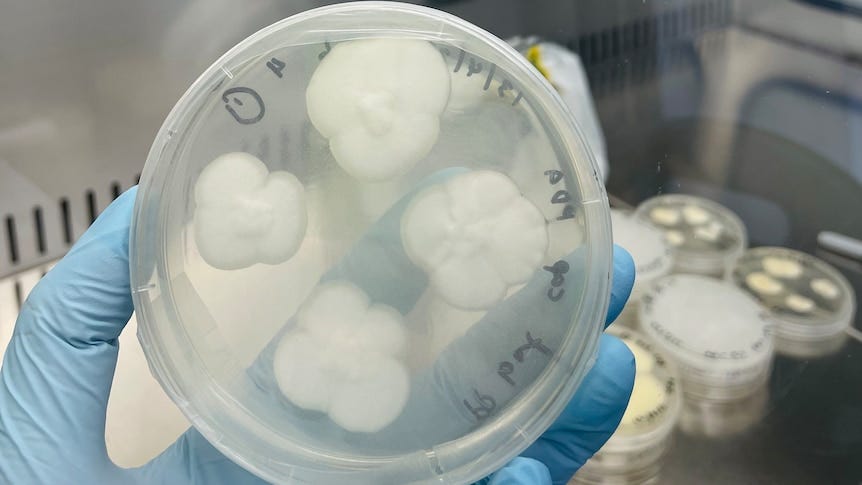Plastic-eating fungi a solution to the recycling crisis?
Fungi Friday's - April 21st, 2023 - Issue 77
Fungi Fam,
Happy Friday! Been a long week to say the least, honestly I think it’s the bipolar weather we’ve been having here. One day it’s 80, the next it’s 50. One moment it’s sunny, the next there’s tornado warnings. Guess that’s just what we get for living in the midwest. That’s alright though, after all, April showers… right?
Enough talk about the weather though, let’s get into what you’re really here for. And boy oh boy, we’ve get another jam packed issue for you all. So kick back, and enjoy closing out your work week with some fantastic, fungi related news!
In today’s email:
Fungi’s potential role in biotech
Enlisting fungi to help solve the plastic waste crisis
Morel season in the midwest off to a bumpy start
Iowa Fungi’s Update of the Week
As you’re reading this, there’s a good chance that 2 of the 3 Iowa Fungi team are on the way down to the FARM! We won’t be whipping up batch numero uno quite yet (fingers crossed for next weekend), but the goal is to begin prep. Also, it happens to be turkey season here in Iowa, so we’re also going to try to whack a gobbler. The updates should start rolling in here, from week to week. Ready or not, here we come!!
Fungal genetics could help develop novel biotechnologies
Fungal genetics is an area of study that is rapidly advancing and has the potential to drive the development of new biotechnologies. Fungi are being investigated for their ability to produce a variety of useful compounds, such as antibiotics, enzymes, and biofuels. The genetics of fungi, which can be manipulated through gene editing and other techniques, can be used to optimize the production of these compounds.
Fungal genetics is also being studied for its potential to solve environmental problems, such as pollution and waste management. Fungi have been shown to be effective in breaking down organic materials, including plastic and oil, and researchers are working to identify the genetic traits that make certain fungi more efficient at these tasks.
Furthermore, the study of fungal genetics is leading to a better understanding of the evolutionary history of fungi, which is important for developing more accurate models of how fungi interact with their environments. This, in turn, could lead to the development of new biotechnologies that can help protect ecosystems and mitigate the impact of climate change.
Overall, fungal genetics is a promising area of study that has the potential to drive innovation in a variety of fields, including biotechnology, environmental science, and medicine.
Psychedelic Spotlight
How Psilocybin Mushrooms Can Help Save the World with Paul Stamets | SXSW 2023
Psilocybin therapy effective for major depression among cancer patients
Plastic-eating backyard fungi discovery boosts hopes for a solution to the recycling crisis
A group of fungi discovered in a suburban garden in Pakistan has been found to have the ability to break down plastic, according to a study. The researchers found that the Aspergillus tubingensis fungus, which was isolated from soil in a private garden, could break down PET plastic in a matter of weeks. PET plastic, which is commonly used in single-use bottles, can take hundreds of years to decompose in the environment.
The discovery raises hopes for a solution to the global plastic pollution crisis, which has led to widespread environmental damage and health risks. Current recycling methods for plastic are often inefficient and expensive, and much of the plastic that is produced ends up in landfills or the ocean.
The study’s authors caution that further research is needed to determine whether the fungus could be used on a large scale to break down plastic waste. Nevertheless, the discovery of this plastic-eating fungus offers a promising avenue for the development of new biotechnologies to help solve the recycling crisis.
The researchers also highlight the importance of studying biodiversity in the natural world, which can offer unexpected solutions to environmental problems.
More Mushroom Mentions
Morel mushroom season hit with wild spring weather
The wild weather conditions of spring have led to a challenging morel mushroom season, with some areas experiencing a delay in their growth and others experiencing an early harvest. Morel mushrooms are highly prized by chefs and mushroom enthusiasts for their distinctive flavor and texture. They typically grow in the spring and early summer, with their appearance and growth largely dependent on weather conditions.
In some areas, heavy rains and flooding have delayed the growth of morel mushrooms, while in other areas, unseasonably warm temperatures have caused the mushrooms to sprout early. Despite the challenges, mushroom hunters remain optimistic about the season, with some even predicting a bumper crop in certain regions.
The popularity of morel mushrooms has led to a significant market for these fungi, with prices reaching as high as $50 per pound for the highest quality specimens. The morel mushroom season is eagerly anticipated by chefs and mushroom enthusiasts, who use the mushrooms in a variety of dishes, including risottos, sauces, and omelets.
While the wild weather conditions of spring have made the morel mushroom season unpredictable, mushroom hunters remain hopeful that they will be able to find and harvest these elusive fungi.
That’s all, folks… but before we let you go, leave a comment below on how we can make the publication even better! And if you haven’t yet, smash that SUBSCRIBE button below.
Thanks for reading as always,
BowTiedMushroom




